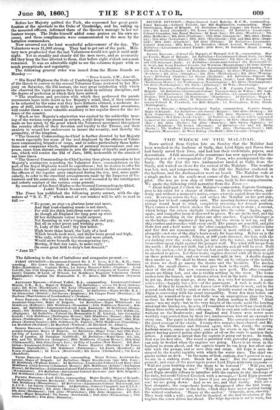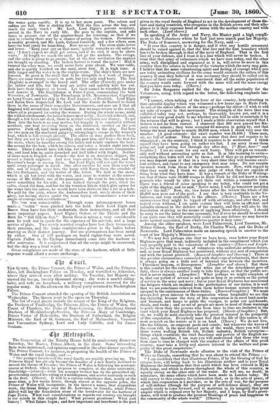THE WRECK. OF THE MALABA.R.
News arrived from Ceylon late on Sunday that the Malabar bad been wrecked in the harbour of Galle, that Lord Elgin and Baron Gros had barely saved their lives, and had lost their credentials, papers, and decorations. A full account of the occurrence has now appeared from the eloquent pen of a correspondent of the Timee' who accompanied the em- bassy. On the 21st the two Ambassadors landed at Gallo from the Simla, and waited on shore for the arrival of the Malabar. The weather was hot, wet, and tempestuous. On the 22d the Malabar anchored in the harbour, and the Ambassadors went on board. The Malabar rode at a single anchor in the south-west corner of the bay, moored there by a pilot. She was an iron ship of 1080 tons, built in five compartments. We quote the following vivid narrative from the Times " About half-past 2 o'clock the lialabar'e commander, Captain Grainger, goes to his cabin for a change of clothes. He is hardly there when, sud- denly and without a moment's notice, comes a terrific squall from the north- east. It sweeps across the bay, and strikes the Malabar on her port side, causing her to heel completely over. The mooring-hawser snaps, and she swings round head to wind, completely reversing her former position. Then comes a shock which shakes the vessel from stem to stern ; a second, which brin,gs the saloon skylight crashing into the cabin. Again, again, again, and lamp after lamp is shivered to pieces. We are on the reef, and the rocks are smashing in our plates one after another. Captain Graingerls on the bridge—the engineer at his post, but the steam is not up, and the ship crashes and crunches with every swell:The pumps are sounded, and give three feet and a half water in the after compartment. Five minutes later and five feet are announced. Our position is most critical ; • not a boat alongside—not one of the ship's boats ready for launching. Before us is the bay with its roaring swell ; behind, at 400 yards distance, the fort, with the sea dashing over the rocks which jut into into the water, and breaking in tremendous spray right against the parapet wall. The wind still keeps from the north ; if it does not shift, but a few minutes and all will be over. Hold on by the anchor,—let it drag but six feet and the engine compartment will be smashed to pieces. Let those heavy engines descend with all their weight on these pointed rocks, and our vessel must split in two. A double danger then awaits us. We shall be blown into the air bv collapse of the bpilers, or down we shall go among the sharks and the "breakers. The (anchor holds ; the squall abates; the wind goes back to the south. She swings clear of the reef. But now commences a new peril. The after compart- ments are filling fast, and she is visibly settling by the stern. The water rushes into the tunnel, and indicates seven feet in the hold. Unless steam be got up, down she must go, stern first, in a very few minutes. A panic seizes some—happily but a few—of the passengers. A rush is made to the boats. If they be launched, the Lascar crew will refuse to work, and in the general rush they' will be sunk or stove in. Quietly seated on the poop, Lord Elgin is conversing with his usual tranquillity. Some few days before one arrival, he remarked to me that Gable was an unpropitious place for him, as there he first heard the news of the Indian mutiny in 1867. Abint omen,' was my reply ; but in the verir height of the crash, amid the howling wind and the hissing sea, he asks, if remember what he told me about Galls. Baron Gros nobly seconds his colleague. He is cool and collected as though walking on the Boulevards; and Englaad and France were never more worthily represented than by their two Ambassadors, who set an example to every one. The panic is but of short duration. The cowards are shamed by the quiet courage of the chiefs. Twenty-five minutes have elapsed, and Mr. Bailey, the Peninsular and Oriental agent, with Mr. .Tanty, the acting harbour-master, comes on board ; and now the steam is up, the chief en- gineer having poured gallon after gallon of oil on the coals to quicken their action. A rumour is spread that.the captain is going out to sea. In truth, that was his first idea. The vessel is provided with powerful pumps, which can only be worked when the engines are going. Therein no room in the harbour to steam ahead, and the captain trusts he can keep her afloat out- side with the pumps, and so save ship and cargo. All hope is soon de- stroyed by the fearful rapidity with which the water rises. The chief en- gineer rushes on deck. In the name of God, captain, don't proceed to sea ; we arc in a sinking state. Beach her at once.' But the rumour gains ground ; and some of the passengers pester Lord Elgin with vain requests :— ' Will not your lordship order the boats to be lowered ?" Will you not protest against going to sea ?" Will you not speak to the captain ?' Lord Elgin steadily refuses to interfere with the captain in the discharge of his duty, but sends Colonel Crealock with a message,—' Lord Elgin presents his compliments, and wishes to know if you are going to ace ? "Going to sea! we are going down.' And so we are, and that visibly. Still not a boat alongside, the cargo-boats having disappeared after the first bump. The quartermasters are at the helm, which they have never quitted during the wildest confusion. Heave at the anchor. 'Cheerily, men, cheerily.' They work with a will ; and, God be thanked, at the first revolution of the engines the screw drives her ahead. The bilge injection is set to work, but the water gains rapidly. It is up to her sternports. The saloon and cabins are full. She is sinking fast. Will she live across the bay, and reach the sandy beach ? Mr. Loch, Lord Elgin's private secretary, served in the Navy in early life. He goes to the captain, and asks leave to prepare one of the quarter-boats for lowering, so that if we sink in crossing there may be a chance of saving the women. Permission is readily granted, and Mr. Loch, Colonel Crealock, and a few others soon have the boat ready for launching. Now we are off, The stern sinks lower and lower. 'Keep your eye on that mast,' quietly remarks an old sailor to me ; • I don't expect we shall get moss, and if we sink it may be above water.' At length we reach the sand. Let go the anchors. She swings, and the order is given to go astern ; but at the first revolution the engines are brought up standing. The broken hawser is round the screw ! Had it twisted the other way, we could never have gone ahead. We veer cable, and she is quietly beached on the sand, stern first. It is high time. A little longer and the water is in the engine-room. The ship's boats are now lowered. So great is the swell that to lie alongside is a work of danger. There are some twenty vessels in port, but two only send boats. The first (English) is swamped in the heavy surf. The other (French) gets under the ladder and fills, but the men are active and quickly bale her out. Both have their skippers on board. Let their names be recorded, for they well deserve it. The Englishman is Peter Upton, commanding the bark Waverley, of Newcastle. The Frenchman is Ch. Messemaccher, Capitaine an Long Cours, and his ship is the Paul Auguste, of Dunkirk. Lord Elgin and Baron Gros despatched Mr. Loch and the Comte de Bastard to thank them in the name of their respective Governments, and sure am I that all England will second that vote of thanks. But we must return to the wreck, where anis prepared for saving the women. During the whole scene, midst the wildest excitement, the ladies behave most nobly. No shriek is heard, and, though a few tears are shed, there is neither confusion nor dismay. To get them into the boats is no easy matter, but happily it is concluded without accident, one boat receiving them on the starboard, another on the port quarter. Push off, land them quickly, and return to the ship. But here are two men on the starboard gangway attempting to escape in the women's boat, which is full enough already. The officer on duty pushes them back, but they are not to be repulsed. They slip past him, and leap—the first for the stern, where he tumbles among the ladies and nearly capsizes the boat ; the second for the bow, which he-misses, and takes a header right into the water. There I should have left him, but the sailors are more compassion- ate, and haul him in, quite drenched and half killed with fright. Neither of these men is English or French—the first is au American skipper, the second a Dutch engineer. And now boats arrive from the shore, and the Governor's barge is among them. But Lord Elgin will not quit the vessel until every passenger is saved. One after another he sees them over the side, and at length steps into the barge with Baron Gros, the attaches of the two Embassies, and the writer of this letter. We look at the stern, which is all but level with the water, and cease to wonder at the narrow escape of Mr. Gifford, one of the passengers. He went to his cabin to re- cover something for his wife. A sea dashed through the port, filled the cabin, closed the door, and but for the venetian blinds which give egress for the water into the saloon, he would have been drowned like a rat in a hole. We pull for the jetty, where the Ambassadors land, sorely shorn of their glory, but having shown under the most trying circumstances a rare ex- ample of courage and steadfastness."
The loss was considerable. Through some mismangement boxes markkel "cabin" were pitched into the hold. Both Lord Elgin and Baron Gros have lost their credentials, their instructions, and all their more important papers. Lord Elgin's Orders of the Thistle and the Bath lie full fathom five." Baron Gros is minus a very considerable gum he took out in specie for the expenses of his mission, and a large service of plate. Two newly married couples have lost their trousseaux, their presents, and the home reminiscences given to the ladies before starting on their distant journey. But one portmanteau has been saved by either. Out of 119 packages on board eighty-four were saved. Captain Pullen in the Cyclops immediately came into the harbour to offer assistance. It is conjectured that all the cargo might be recovered, but the ship was a total wreck. Great complaints are made of the state of the harbour, which at little expense would afford a secure anchorage.



























 Previous page
Previous page